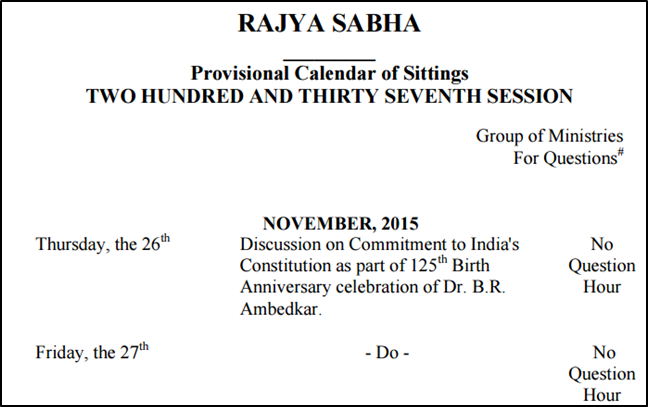
Here Is How You Can Follow The Proceedings Of Parliament
4 Dec 2015 2:58 AM GMT
Originally Published On Factly | Author: Rakesh Dubbudu | Image Source: rajyasabha
The Proceedings of Parliament are the most important part of a democracy. The proceedings include Legislation, Debates on the pressing issues, Questions by Members of Parliament (MPs) and answers by the Government of the day. While the proceedings are telecast live on both the Lok Sabha TV and Rajya Sabha TV, it is not possible for most people to watch them through the day. The Lok Sabha & Rajya Sabha websites are probably the most dynamically updated with most information available at the end of each day of sitting.
Here is a guide how a common citizen can follow the proceedings of Parliament.
Step 1: Start with the Provisional Calendar
For every session of Parliament, the provisional calendar of both the Lok Sabha (LS) & Rajya Sabha (RS) is uploaded onto the respective websites. The provisional Calendar lists down the broad business planned for the entire session. This list is subject to changes, but it does give the basic idea of what is planned.
Step 2: Check the List of Business planned for each day
Both the LS & RS websites upload the List of Business planned for each single day. The List of Business contains the main agenda items to be taken up on that particular day, and is generally issued daily during session period, two days prior to the sitting date. The final agenda is contained in the Revised List of Business and is issued the preceding working day of the sitting. A Supplementary List of Business is issued to cover any additional items being taken up at short notice, the same day. Sometimes, a second Supplementary List of Business is also issued the same day.
Step 3: Read the Bulletins at the end of the day
At the end of each day of sitting, the LS & RS secretariats come up with two bulletins. The first bulletin is more like a summary of the day’s proceedings. The second bulletin is about important announcements or information given during the day. For those who have very little time to spare, these are a great way to keep up to date with the proceedings. For e.g., the details of a unanimous resolution passed by the Lok Sabha at the end of the two days of special discussion on the 125th birth anniversary of Dr. B R Ambedkar is part of the first bulletin of the Lok Sabha.
If a particular bill was introduced, discussed or passed by the LS or RS on any given day, those will be available on both the websites. You can search for a specific bill and download the text of the bill.
Step 4: Search for the Questions & Answers
The question hour is usually at 11am every day for an hour in both the houses. The day wise list of questions asked by the MPs is available on the websites of LS & RS. This list is available a few days in advance. The answers given by the government usually take a day or two to be uploaded. You could keep a tab on the questions and the answers you are interested in by searching the question database on both LS & RS websites.
Step 5: Read the verbatim debates
For those who have enough time at their disposal, the LS & RS websites have uncorrected verbatim debates hour by hour. The uncorrected debates might also have text that is asked to be removed from records by the speaker. Both the websites also have a synopsis document capturing the debate.
Other information available on the LS & RS Websites
Wit & Humour: Apart from the serious discussion, there is also a bit of Wit & Humour in these debates. These details are also available on the LS & RS websites.
Special Mentions: Apart from the regular questions & debates, MPs can raise pressing issues as special mentions with prior approval of the speaker. This list is also available on both the websites.
Resume of Work: At the end of every session, the resume of work is prepared & uploaded on both the websites. This document has detailed information on all the important business that took place during that session.
Statement of Work: The statement of work document has detailed statistical information on each session like number of sittings, time of sittings, time lost due to disruptions etc.
 All section
All section













